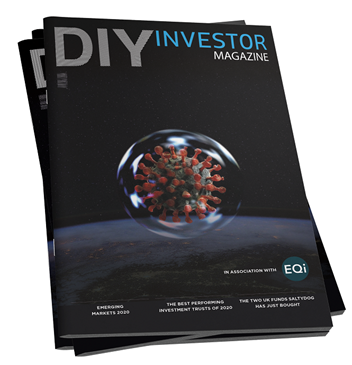Private markets: the quest for diversification


By Nalaka De Silva, Investment Manager,
Aberdeen Diversified Income and Growth Trust plc
Institutional investors have long thought of private markets as a way to boost returns. But the recent challenging economic conditions have further enhanced the role that private market investments can play in portfolios.
In particular, investors are now relying on private markets to help diversify their portfolios. At Aberdeen Diversified Income and Growth Trust, we think this shift reflects two trends. Firstly, a greater correlation between public debt and equities. And, secondly, a growing awareness of the opportunity to diversify within private markets.
Institutional investors also remain aware of the importance of portfolio liquidity. Their ability to meet cashflow needs for benefit payments, rebalancing or other capital obligations is vital. A growing private market has eased this concern as there are more players looking to buy, sell, or trade at any given time.
A spotlight on private markets
Private markets used to be a dark and opaque space for investors. But it’s now emerging as a big landscape of opportunities that includes real estate, infrastructure, natural resources, private equity and private credit. Investors had started exploring these areas over the past decade, but that trend has accelerated during the pandemic.
The new interest is emerging against the backdrop of growing venture capital. The cost of building and running a company has become much cheaper in recent years.
Technology giants like Alibaba, Snapchat and Facebook have had multi-billion dollar initial public offerings. And it’s clear that there’s a massive opportunity to create value in private hands before companies even reach the public markets.
Opportunities exist at various levels. The private market caters for investors looking to buy into riskier start-ups, as well as those who want to hold more mature private companies. Even before the pandemic, private companies were staying private for longer. This trend is unlikely to change in the current environment.
Private income
There’s been an influx of high-quality infrastructure projects, which investors would previously have funded via government bonds. But now private funding has blossomed to cover opportunities to invest in schools, hospitals, roads and other projects that are essential to local economies.
Private income investments have also expanded as capital-constrained banks have pulled back on lending. This followed a spate of regulations in response to the global financial crisis of 2008-2010. Investors used to think of private markets as just private equity, but there is now a vast and growing private capital debt market.
Diverse opportunities
The global economic challenges of 2020 have created further opportunities for private market investors. This is particularly the case for real estate and supply chains, which have experienced pandemic-related disruption.
For example, the growth of ecommerce has affected logistics and retail markets. There are also new opportunities in technology, such as systems that have enhanced working-from-home productivity and allowed for the delivery of virtual education and healthcare.
Over the longer term, we are going to see more remote working that spans a whole range of industries. What does that mean for real estate in terms of how people manage space? And what does it mean for residential property and how people live, work and play?
We think these changes will create opportunities in real estate and in private equity. There will also be opportunities in terms of how we finance some of these transactions.
A focus on sustainability
Private markets provide an opportunity for investors to focus on environmental, social and governance (ESG) factors within their portfolios. ESG investments can also help investors who are looking to use their capital in a more effective way.
As direct owners of a private investment, investors have more say over environmental policies and stakeholder management. As such, ESG becomes more embedded in the business.
We can make operational changes regarding a company’s environmental footprint, diversity and social aspects. We can also look at the supply chain more carefully and ensure companies pay living wages.
There’s a growing recognition that if investors minimise ESG factors today, it will only create material issues later. This can create regulatory scrutiny or reputational risk.
Private companies that are as transparent as possible about their ESG process will have an advantage. This is particularly the case when it comes to raising capital and growing value for investors.
Balancing the portfolio
Despite how private markets have evolved recently, many institutional investors are still underweight in the asset class, mainly due to implementation issues.
They often have low or no exposure to private equity or infrastructure, or they might lack either the debt or equity side. Since assets can’t be priced and traded overnight, investors need lawyers, accountants and finance experts that understand the assets and the complexity around them.
Investors are now rethinking how they can generate returns and meet their objectives. The vast and varied scope of private markets may provide part of the answer.
A version of this article was first published on Pensions & Investments Online on 30 November 2020.
Important information
Risk factors you should consider prior to investing:
- The value of investments and the income from them can fall and investors may get back less than the amount invested. The investment places capital at risk and there is no guarantee that the performance target will be achieved over any time period.
- Past performance is not a guide to future results.
- Investment in the Company may not be appropriate for investors who plan to withdraw their money within 5 years.
- The Company may borrow to finance further investment (gearing). The use of gearing is likely to lead to volatility in the Net Asset Value (NAV) meaning that any movement in the value of the company’s assets will result in a magnified movement in the NAV.
- The Company may accumulate investment positions which represent more than normal trading volumes which may make it difficult to realise investments and may lead to volatility in the market price of the Company’s shares.
- There is no guarantee that the market price of the Company’s shares will fully reflect their underlying Net Asset Value.
- As with all stock exchange investments the value of the Company’s shares purchased will immediately fall by the difference between the buying and selling prices, the bid offer spread. If trading volumes fall, the bid-offer spread can widen.
- Yields are estimated figures and may fluctuate, there are no guarantees that future dividends will match or exceed historic dividends and certain investors may be subject to further tax on dividends. Derivatives may be used, subject to restrictions set out for the Company, in order to manage risk and generate income. The market in derivatives can be volatile and there is a higher than average risk of loss.
- The Company may invest in alternative investments (including direct lending, commercial property, renewable energy and mortgage strategies). Such investments may be relatively illiquid and it may be difficult for the Company to realise these investments over a short time period, which may make it difficult to realise investments and may lead to volatility in the market price of the Company’s shares.
- Investing globally can bring additional returns and diversify risk. However, currency exchange rate fluctuations may have a positive or negative impact on the value of investments.
Other important information:
Issued by Aberdeen Asset Managers Limited which is authorised and regulated by the Financial Conduct Authority in the United Kingdom. Registered Office: 10 Queen’s Terrace, Aberdeen AB10 1XL. Registered in Scotland No. 108419. An investment trust should be considered only as part of a balanced portfolio. Under no circumstances should this information be considered as an offer, investment recommendation or solicitation to deal in investments.
Find out more at www.aberdeendiversified.co.uk or by registering for updates.
You can also follow us on Twitter and LinkedIn.
Click to visit:
Read the latest edition of DIY Investor Magazine
DIY Investor Magazine
The views and opinions expressed by the author, DIY Investor Magazine or associated third parties may not necessarily represent views expressed or reflected by EQi.
The content in DIY Investor Magazine is non-partisan and we receive no commissions or incentives from anything featured in the magazine.
The value of investments can fall as well as rise and any income from them is not guaranteed and you may get back less than you invested. Past performance is not a guide to future performance.
DIY Investor Magazine delivers education and information, it does not offer advice. Copyright© DIY Investor (2016) Ltd, Registered in England and Wales. No. 9978366 Registered office: Mill Barn, Mill Lane, Chiddingstone, Kent TN8 7AA.

